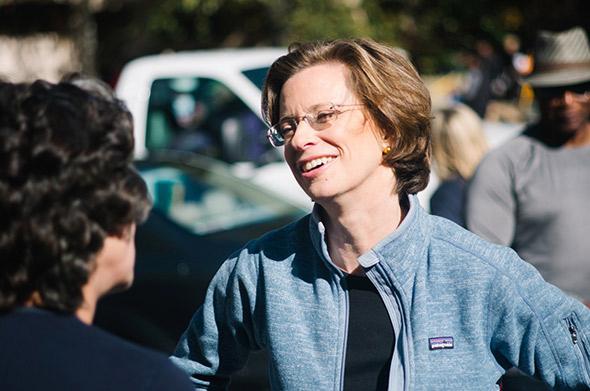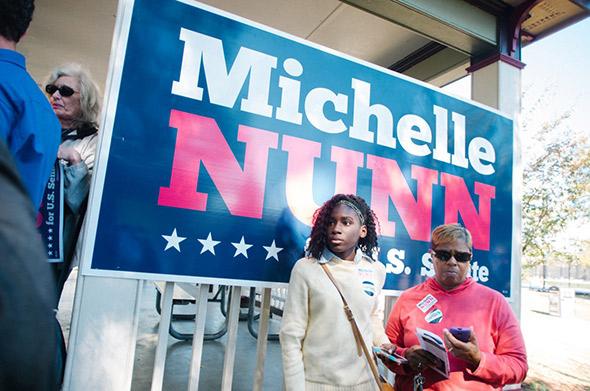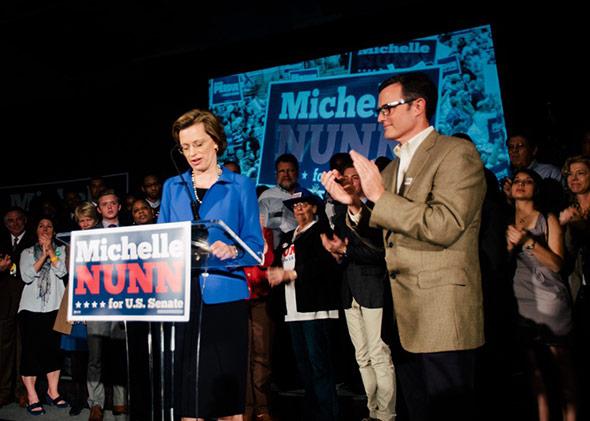Ayisha Cissé was one of the few people left after Michelle Nunn conceded Georgia’s U.S. Senate race to her Republican opponent, David Perdue, thanked her supporters, and left the hotel ballroom that—for most of the night—was host to a large celebration of the campaign.
Cissé was disappointed with the results, but she was also hopeful for what might come next. “This was historic,” she said. “When you’re making inroads, you’re walking a middle road. Michelle inspired a lot of people, especially in a state primed to reject someone of her gender and her values.”
This sentiment was typical of the people who witnessed Nunn’s final address, which might have had something to do with the nature of Nunn’s remarks. Nunn had started her remarks with a concession to Perdue, but she didn’t quite give a concession speech. Instead, she claimed a partial victory. “We have laid the groundwork for the future,” she said. “We have shown the people of Georgia what a two-party state looks like.”

Photo by Jamelle Bouie
Her supporters echoed this optimism. “People are definitely going to follow in her footsteps,” said Bianca Horton. “Especially young people and women. [Nunn] laid the groundwork, and we’re going to follow through.” Likewise, said another supporter—who was trying to console his partner as he gave his take on the night—“Michelle ran a very good campaign that made this a real race. Maybe after this we’re a slightly less red state.”
I think that’s right. Over the course of a year, the Nunn campaign and its allies successfully capitalized on Georgia’s rapid demographic change, registering tens of thousands of new voters and bringing them to the polls. In the process, they turned a lean GOP election into a genuine tossup, forcing a real effort from the state and national Republican parties. Indeed, when all the votes are tallied, Nunn will have outperformed Democratic candidates in the 2004 and 2010 Senate races, and will have likely matched President Obama’s performance in 2012. And while we can’t quite say Democrats will have the advantage in 2016—though, with a more diverse electorate and the higher mobilization of a presidential race, it’s possible—we can easily predict another competitive election.

Photo by Jamelle Bouie
Which is to say that, going forward, it’s hard to say that Georgia is a “red state” like its neighbors South Carolina or Alabama, which are avowedly hostile to Democrats. Instead, it’s more accurate to call Georgia a red-leaning state that could—with the right conditions—turn purple.
Or, as former Sen. Sam Nunn said to me early in the night, “I think when you [see] this much excitement, it’s going to put Georgia in play for 2016. Whatever the vote is, I think people see this excitement, and how many people are involved in the campaign. This diverse blend of people working together—white, black, Hispanic, women, young people, urban, rural—all [the] away around.”

Photo by Jamelle Bouie
This diversity, it should be said, is unprecedented. For most of its history, Georgia has been governed by a limited class of affluent whites. Now, for the first time, we have a large, multicultural electorate. And it will bring major changes.
“Redistricting is on the horizon,” says Rep. Stacey Abrams, the Georgia House minority leader and head of the New Georgia Project, which made news as an unprecedented registration effort aimed at Georgia’s minority communities, but is focused on the long term. Specifically, Abrams—and the Rev. Dr. Raphael Warnock of Ebenezer Baptist Church—see Georgia’s rapid demographic change as a chance to construct a genuinely interracial political culture.
“If we have a race-based politics rather than a value-based politics, we’re going to be in trouble,” says Abrams, who fears a future in which various racial groups fight over existing resources rather than working together to expand “shared resources.” “We can acknowledge race without relying on it,” she says. It’s less of a “post-racial” vision and more of a “race, and” approach, whereby different groups have different interests, but can unite toward a common goal.
Over the next decade, they plan to do the hard work of educating and mobilizing, of teaching people about local government and state races, and of turning Georgia into a place where progressive values can thrive, not just survive. For them, the Nunn campaign isn’t a failure—it’s the start of a long-term project to transform Georgia and harness the promise of its current shifts. It is, in other words, just the beginning.
